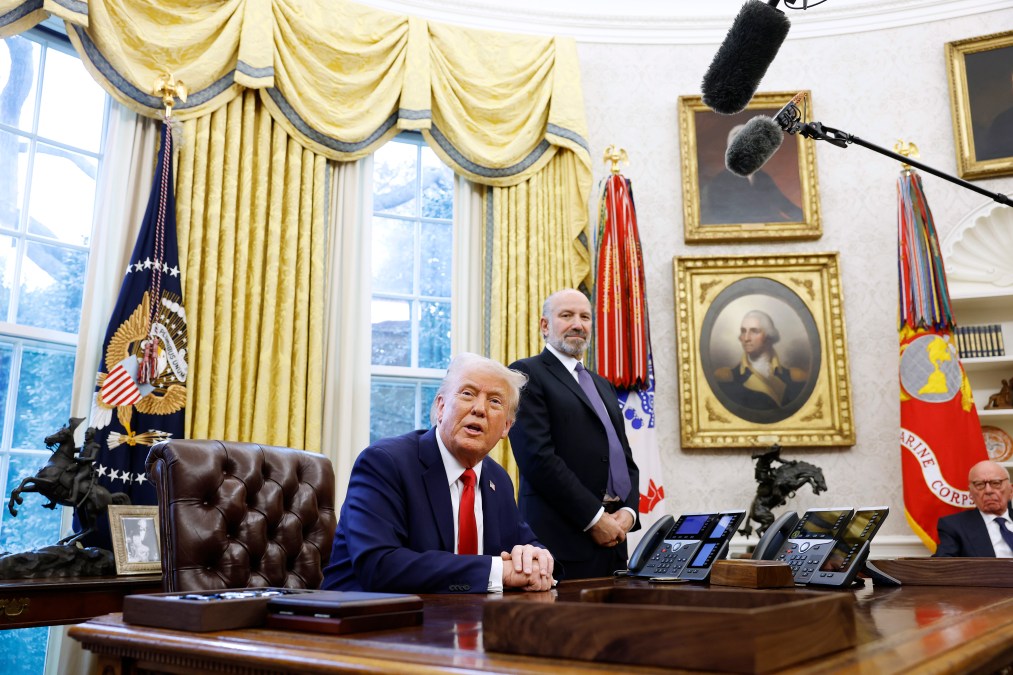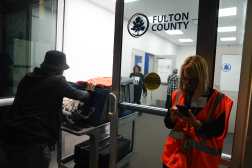Trump administration setting the stage for elections power grab, voting rights group warns

Election officials should brace for direct attacks from the Trump administration and its state GOP allies on the integrity of U.S. elections — and plan for the possibility that federal agencies once charged with protecting elections will leverage their authorities to interfere in the process, a voting rights nonprofit warned.
In a report released Wednesday, researchers at the Brennan Center for Justice say the Trump administration’s actions suggest that the White House is preparing for an unprecedented federal intervention in the way elections are administered ahead of 2026 and 2028.
Those interventions include attempts to enact state-level bans or restrictions on mail-in voting, the use of lawsuits or criminal charges against election officials who don’t follow President Donald Trump’s orders, pushing mass state voter roll purges based on potentially inaccurate citizenship data, the deployment of the military in American cities and towns to intimidate voters and state officials, and the potential decertification or seizure of voting machines.
The scenarios are all based on actions the administration has already taken this year or in its first term, statements made by Trump and his aides, lawsuits filed by the Department of Justice and supporting efforts from Republican-led state legislatures.
Lawrence Norden, vice president for the elections and government program at the Brennan Center and one of the report’s authors, told CyberScoop that the document is targeted at three audiences who will be on the front lines in Trump’s war for control over elections: state election officials, policymakers and the public at large.
In 2020, the public was subjected to a deluge of false and unproven claims around election fraud, dead voters and hacked voting machines. While those claims had limited effect influencing voters outside of Trump’s orbit, many federal officials — including Chris Krebs, his own nominee for cybersecurity and election security chief — contradicted his claims of mass fraud. This April, Trump ordered the Justice Department to investigate Krebs for his statements about the 2020 election.
This year, the Department of Homeland Security hired Marci McCarthy and Heather Honey, who both actively tried to overturn the results of the 2020 election. McCarthy is now the top public affairs official at CISA, while Honey was recently named to a position overseeing election security efforts at DHS. Other agencies, like the FBI and the DOJ, have shifted from supporting state elections to investigating and suing election offices over their voter registration practices.
Whatever the administration ends up doing, Norden said it would be wise to plan ahead for different possibilities.
“One of the most effective ways to defeat misleading or false information is to call it out ahead of time, so when it comes to [dubious] reports we might see from government agencies, better to call it out now and say that this is part of a concerted effort and there are reasons not to trust it,” Norden said.
Meanwhile, he said policymakers at the state level “need to be planning and preparing for the next steps” to protect their constitutional rights while running upcoming elections.
“So being ready to have the backs of their election officials, being ready for politicized investigations that may come, being ready for efforts to interfere in the ability of election officials to run their elections according to state law, they need to be preparing for that now,” Norden said.
Trump uses public doubt and skepticism as policy fuel
One possibility floated in the report is the administration moving to decertify voting machines used in some or most states through the Election Assistance Commission. Last week, Trump argued against mail-in ballots and “voting machines,” claiming an executive order that limited their use would soon be issued. The EAC is responsible for overseeing the labs that test and certify voting machines nationwide to ensure they are secure and meet the necessary standards.
While the White House later walked back the possibility of an executive order, the administration has already attempted to compel the EAC to alter voter registration forms to require proof of citizenship and withhold federal funding to states that do not cooperate with federal agencies on election-related matters. A federal judge has nullified parts of that order.
Such certifications are technically voluntary on the part of voting machine manufacturers, but states and localities have overwhelmingly treated them as industry standard when purchasing their machines. Depending on the timing, the mass decertification of certain systems ahead of an election could inject chaos among states, which cannot easily or quickly buy, replace, and test new voting equipment.
For states that do count votes using decertified machines, it could lead the public and political leaders to question the legitimacy of future results. This may give the Trump administration more support to sow doubt and challenge how states run their elections, the type of ballots they accept and how they process vote counts.
The perception of voting impropriety in any future messaging from the Trump administration, even if it is false, is a key issue states will also have to contend with. All politicians use repetition in their political messaging, but for Trump, it is especially crucial to how he communicates, regardless of the actual facts.
Stacy Rosenberg, an associate teaching professor at Carnegie Mellon’s public policy school, told CyberScoop that Trump’s rhetorical style requires aggressive repetition around simple themes — like mass noncitizen voting and poorly maintained voter rolls —, because they help create the political will for the administration and its allies to take more extreme actions that couldn’t otherwise be justified based on law or precedent.
“The attempt to have federalized voting is not something we typically see in the United States, so when elections are questioned, there may be people who say, ‘well, it’s justified for the federal government to come in and make changes,’” Rosenberg said. “We’ll have to see how the courts handle that. It doesn’t really fall into the domain of an executive order, so I think the question is: what can they do that the courts will allow?”
Norden said that while it’s clear the president doesn’t have the kind of direct authority over state-run elections he’s claiming, he does have the power to “both mislead and to intimidate people, whether it’s election officials or voters.”
“The good news is that if we see them for what they are, those are limited powers,” Norden said. “As long as the states step up and defend their elections, as long as voters come out and vote, that’s not enough to undermine elections. But we have to see what’s happening for [that defense] to be effective.”
In terms of counter messaging on the part of states, Rosenberg said much will rest on how courts respond to federal challenges, but from a strategy perspective “the number one thing [election officials] have to know is, you’re going to be called fake news.”
The Trump White House has “continued that line of attack through his first term to his present day. The way they want to control the message by saying everyone else’s message is false is a persistent strategy,” she said.
Pointing to the administration’s previous efforts to strong-arm universities and law firms, Rosenberg noted that while no one was left unscathed, those who fared best tended to confront Trump head-on rather than try to accommodate him.
“I think all you can do is stand your ground, file your lawsuits or counter lawsuits as you need to, but I think you need to continue to do the ethical hard work that you’ve done prior to the administration,” she said.






